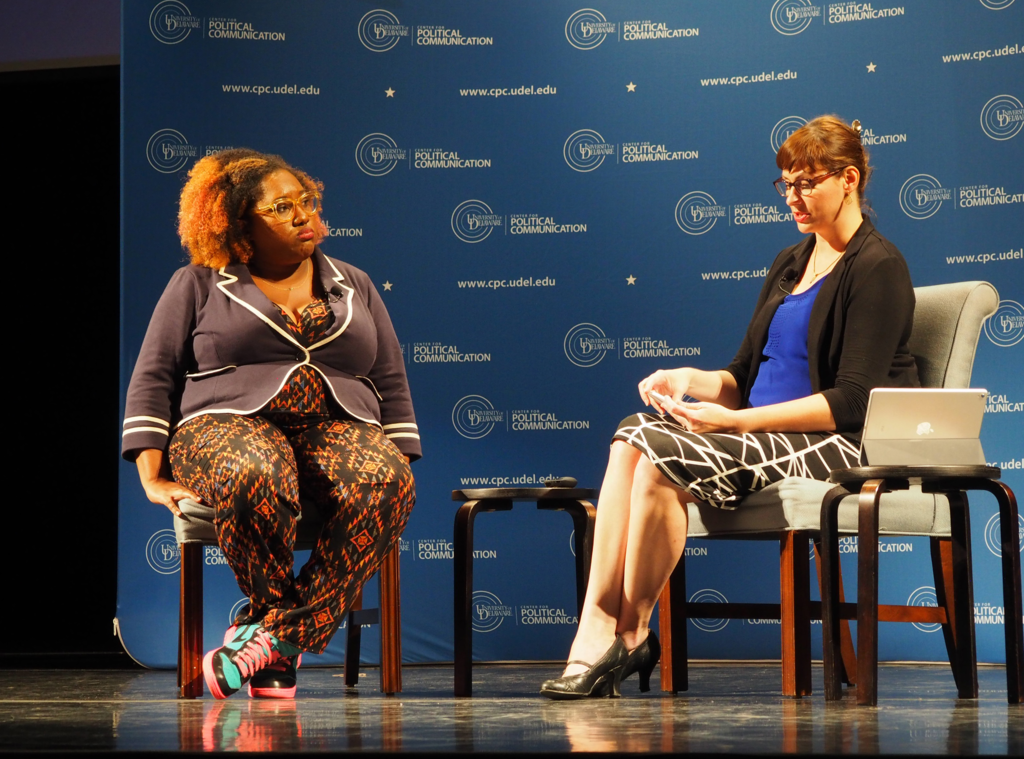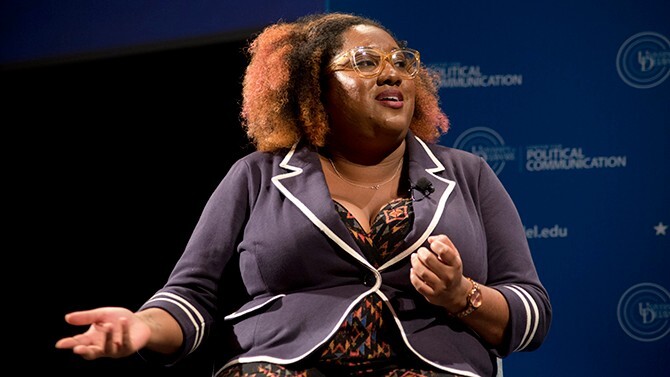Casting a vote for comedy
“Full Frontal? writer discusses humor, satire, politics in National Agenda talk

Article by Ann Manser, September 23, 2016 — (See the entire conversation here.)
People who wonder if comedy really has a place in the world of serious political discussion are missing the lessons of history, comedian and writer Ashley Black told an audience at the University of Delaware.
“Comedy has always been about politics [and] it still serves a political function,” said Black, a writer for the political satire television show Full Frontal with Samantha Bee.
Dating back to the “Old Comedy? style of ancient Greece, which was based on ridiculing politicians and public affairs, that role for comedy has continued through the centuries, she said. The only difference, she noted, is whether the political aspects of a particular comedy piece are relatively hidden or explicit.
Black spoke on Wednesday, Sept. 21, at UD’s Mitchell Hall as part of the National Agenda speaker series, which this semester focuses on the presidential elections. Her talk included video clips from the Second City comedy club – where she appears regularly – and episodes of Full Frontal, taking on issues from abortion legislation to the nationwide problem of rape kits languishing, untested, in police evidence rooms.
Viewers often complain online about the show’s “bias,” she said, which demonstrates their lack of understanding of the genre. Full Frontal, she pointed out, is satire, not news, and so of course its pieces show a point of view and an opinion on the issues.
“We get accused of bias from the right and the left, so we”re doing something right,” Black said. “I think that we”re biased toward the truth.”
She expressed doubt that political satire has much influence on voting behavior or public policy, although she said shows like Full Frontal can serve a fact-checking function. Journalists are often criticized for not aggressively challenging a person they are interviewing about false statements, and Black said that Bee, for example, can more easily take on that role.
“We do it because someone has to do it [but] it shouldn’t be a comedian’s job,” she said.
During a question-and-answer session after the talk, Black was asked about the relative lack of diversity in late night talk shows. Full Frontal has attracted a lot of attention for the number of women and people of color on its writing staff, and Black, as an African American woman, noted how exceptional the show’s diversity is.
The problem, she said, begins when shows solicit applications from comedy writers by working through agents and managers, who generally don’t have a diverse list of clients. Black called that “the bottleneck? in the process that results in most applicants for writing jobs being white men.
She urged a change in the process: “The audience is diverse, and people want to see something that represents their experience,” she said, adding that large segments of the audience don’t even tune in to late night shows because they don’t see relevance to their own lives.
About the series

The 2016 National Agenda series, “Road to the Presidency,” features a wide variety of speakers discussing issues surrounding the presidential election.
All events are free and open to the public and held on Wednesday evenings in Mitchell Hall from 7:30-9 p.m.
The next program in the series, scheduled for Oct. 5, will feature D. Watkins, author of two books – The Beast Side and The Cook-Up ? detailing life as an African-American man growing up in Baltimore.
The director of the National Agenda series is Lindsay Hoffman, associate professor of communication and associate director of UD’s Center for Political Communication.
National Agenda was established by Ralph J. Begleiter, former CNN world affairs correspondent and professor in the Department of Communication, who created and was the first director of UD’s Center for Political Communication.
Through the years, the series has looked at a range of key American political issues, from corporate influence to the growing importance of digital campaigns.
National Agenda 2016 is supported by the William P. Frank Foundation of Delaware and UD’s College of Arts and Sciences and Office of the Provost.
